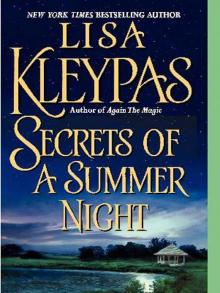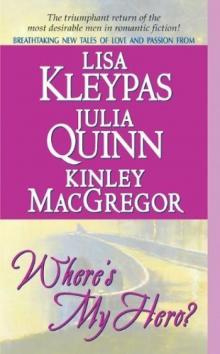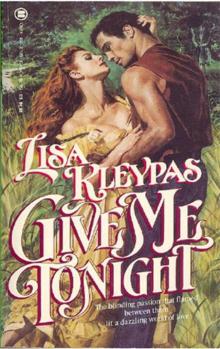- Home
- Lisa Kleypas
Cold-Hearted Rake Page 18
Cold-Hearted Rake Read online
Page 18
Indecipherable Welsh phrases tore through the air before Winterborne said in English, “My leg is broken.”
Cursing, Devon shoved more debris aside and found a brass window bar that had broken from its rivets. He crawled over another seat and reached upward for the locked side door on the downstream side of the current. Gasping with effort, he used the brass rod as a makeshift crowbar to pry open the door. The diagonal tilt of the carriage made it difficult work. And all the while, water rushed in, swirling up to their knees now.
Once the lock was broken, Devon pushed the door open until it swung free and thudded against the outer side of the vehicle.
Poking his head out, he calculated their distance from the riverbank. The water appeared to be no more than hip deep.
The problem was the extreme cold, which would finish them off quickly. They couldn’t afford to wait for help.
Coughing from the smoke-glazed air, Devon ducked back into the carriage. He found Winterborne pulling shards of glass from his hair, his eyes still closed¸ his face scored with a mesh of bloody scratches. “I’m going to pull you outside and guide you to the river’s edge,” Devon said.
“What’s your condition?” Winterborne asked, sounding remarkably lucid for a man who’d just been blinded and had his leg broken.
“Better than yours.”
“How far are we from solid ground?”
“About twenty feet.”
“And the current? How strong is it?”
“It doesn’t bloody matter: We can’t stay here.”
“Your odds are better without me,” came the calm observation.
“I’m not going to leave you in here, you arse-witted bastard.” Devon gripped Winterborne’s wrist and pulled it across his shoulders. “If you’re afraid you’ll owe me a favor after saving your life…” With effort, he towed him toward the open doorway. “… you’re right. A huge favor.” He set a foot wrong and they both stumbled. Reaching out with his free hand, Devon grabbed hold of the doorway to secure their balance.
A lacerating jolt pierced through his chest, momentarily stealing his breath. “Christ, you’re heavy,” he managed to say.
There was no reply. He realized that Winterborne was fighting not to lose consciousness.
With every excoriating breath, Devon felt the stabs in his chest lengthen into an unbroken shrill of agony. His muscles locked and spasmed.
Too many complications were piling up… the river, the cold, Winterborne’s injuries, and now whatever was causing him such pain. But there was no choice except to keep moving.
Gritting his teeth, he managed to tug Winterborne upward and out of the carriage. Together they splashed into the water, which caused Winterborne to cry out in agony.
Clutching him, Devon struggled to find purchase, anchoring his feet into the gluey river bottom. The water was higher than he’d estimated, reaching well over his waist.
For a moment the shock of cold paralyzed him. He concentrated on forcing his locked muscles to move.
“Winterborne,” he said through gritted teeth, “it’s not far. We’ll make it.”
His friend replied with a succinct curse, making him grin briefly. Laboring against the current, Devon waded toward the reed bed at the riverbank, where other survivors of the accident were crawling out.
It was hard, exhausting work, the mud sucking at his feet, the frigid water sapping his coordination and shutting down all feeling.
“My lord! My lord, I’m here!” His valet, Sutton, was standing at the river’s edge, waving to him anxiously. It appeared he had climbed down the escarpment from the derailed carriages still poised on the bridge.
The valet plunged into the shallows, gasping at the bone-chilling temperature.
“Take him,” Devon said brusquely, dragging the half-conscious Winterborne through the reed bed.
Sutton locked his arms around the other man’s chest and pulled Winterborne to safety.
Devon felt his knees give out, and he staggered among the reeds, fighting not to collapse. His exhausted brain worked to summon his last reserves of strength, and he lurched toward the bank.
He stopped as he became aware of frantic, high-pitched cries. Looking back over his shoulder, he saw that passengers still occupied one of the compartments of a flooded carriage that had landed in the river at a diagonal tilt.
They hadn’t been able to break open the locked door. No one had gone to help them; the survivors who had made it out of the water had collapsed from the cold. Rescuers were only now just beginning to arrive, and by the time they made it down the embankment, it would be too late.
Without giving himself time to consider it, Devon turned and sloshed back out into the water.
“Sir,” he heard Sutton call out.
“Look after Winterborne,” Devon said brusquely.
By the time he reached the carriage, he was numb from the waist down and struggling through a haze of confusion. Through pure force of will, he fought his way into a compartment of the carriage, through the space in a wall that had been torn by the force of the accident.
He went to a window and gripped a brass rod. It took immense concentration to make his hand close around it properly. Somehow he managed to wrench it free of the wall, and waded through the carriage to plunge back into the river.
As he used the bar to pry at the door of the locked compartment, he heard screams of relief from inside. The door opened with a protesting groan of metal, and passengers crowded the opening. Devon’s bleary gaze took in a middle-aged woman holding a squalling baby, two weeping girls, and a boy in his early teens.
“Are there any more in there?” Devon asked the boy. His voice was slurred, as if he were drunk.
“None alive, sir,” the boy said, shivering.
“D’you see those people at the side of the river?”
“I th-think so, sir.”
“Go there. Take the girls arm-in-arm. Keep your sides to the current… less for it to push against. Go.”
The boy nodded and plunged into the river, gasping at the intense cold that reached up to his chest. The frightened girls followed with shrieks, clutching at his arms. Together the trio moved toward the riverbank, steadying one another against the current.
Turning to the terrified woman, Devon said tersely, “Give me the child.”
She shook her head wildly. “Please, sir, why —”
“Now.” He wouldn’t be able to stay on his feet much longer.
The woman obeyed, weeping, and the child continued to wail as he curled his little arms around Devon’s neck. His mother gripped Devon’s free arm and stepped from the carriage, letting out a shrill cry as she plunged into the water. Step by step, Devon hauled her through the river, the weight of her skirts making progress difficult. He soon lost all sense of time.
He wasn’t quite certain where he was, or what was happening. He couldn’t be sure that his legs were still working; he couldn’t feel them. The baby had stopped crying, his hand groping curiously over Devon’s face like a migrating starfish. He was vaguely aware that the woman was shouting something, but the words were lost amid the sluggish pulse in his ears.
There were people in the distance… hand lamps… lights dancing and bobbing in the smoke-blistered air. He kept pushing on, impelled by the dim understanding that to hesitate even for a moment was to snap the last thread of consciousness.
His mind registered a tug at the child in his arms. Another stronger pull, as he resisted briefly. The child was being gathered up by strangers, while others had come forward to help the woman through the sludge of reeds and mud.
Losing his balance, Devon staggered back, his muscles no longer obeying his commands. The water snatched him instantly, closing over his head and dragging him away.
As he felt himself carried by the current, his brain hovered over the scene, observing the slowly spinning form – his own – in the inky water. He couldn’t save himself, he realized with dazed surprise. No one was going to save him. H
e had met the same untimely fate as all the Ravenel men, leaving far too much unfinished, and he couldn’t even bring himself to care. Somewhere in the rubble of his thoughts, he knew that West would manage without him. West would survive.
But Kathleen…
She would never know what she had meant to him.
That pierced his failing awareness. Dear God, why had he waited, assuming he had time at his disposal? If he could have had five minutes to tell her… bloody hell, one minute… but it was too late.
Kathleen would go on without him. Some other man would marry her… grow old with her… and Devon would be nothing but a faded memory.
If she remembered him at all.
He struggled and flailed, a silent howl trapped inside. Kathleen was his fate, his. He would defy all the hells that ever were to stay with her. But it was no use; the river bore him steadily away into the darkness.
Something caught at him. Tough, sinewed bands twined around his arm and chest like some monster from the deep. An inexorable force wrenched him painfully backward. He felt himself gripped and held fast against the current.
“Oh, no, you don’t,” a man growled close to his ear, gasping with effort. The secure grip tightened around his midriff, and he began to cough, spikes of agony driving through him as the voice continued. “You’re not leaving me to manage that bloody estate on my own.”
Chapter 17
“T
he train must have been late,” Pandora said crossly, playing with the dogs on the receiving room floor. “I hate waiting.”
“You could occupy yourself with a useful task,” Cassandra said, poking away at her needlework. “That makes waiting go faster.”
“People always say that, and it’s not true. Waiting takes just as long whether one is being useful or not.”
“Perhaps the gentlemen have stopped for refreshments on the way from Alton,” Helen suggested, leaning over her embroidery hoop as she executed a complicated stitch.
Kathleen looked up from an agricultural book that West had recommended to her. “If that’s the case, they had better be famished when they arrive,” she said with mock indignation. “After the feast Cook has prepared, nothing less than gluttony will suffice.” She grimaced as she saw Napoleon settling into the billowing folds of Pandora’s dress. “Darling, you’ll be covered with dog hair by the time the gentlemen arrive.”
“They won’t notice,” Pandora assured her. “My dress is black, and so is the dog.”
“Perhaps, but still —” Kathleen broke off as Hamlet trotted into the receiving room with his perpetual grin. In all the bustle of holiday preparations for that evening, she had forgotten about the pig. She had become so accustomed to the sight of him following Napoleon and Josephine everywhere that she had begun to think of him as a third dog. “Oh, dear,” she said, “something must be done with Hamlet. We can’t have him wandering about while Mr. Winterborne is here.”
“Hamlet is very clean,” Cassandra said, reaching down to pet the pig as he came up to her and grunted affectionately. “Cleaner than the dogs, actually.”
It was true. Hamlet was so well-behaved that it seemed unjust to banish him from the house. “There’s no choice,” Kathleen said regretfully. “I’m afraid that Mr. Winterborne can’t be expected to share our enlightened view of pigs. Hamlet will have to sleep in the barn. You can make him a nice bed of straw and blankets.”
The twins were aghast, both of them protesting at once.
“But that will hurt his feelings —”
“He’ll think he’s being punished!”
“He’ll be perfectly comfortable —” Kathleen began, but broke off as she noticed that both dogs, alerted by a noise, had hurried from the room with their tails wagging. Hamlet rushed after them with a determined squeak.
“Someone is at the front door,” Helen said, setting aside her embroidery. She went to the window for a glimpse of the front drive and portico.
It had to be Devon and his guest. Jumping to her feet, Kathleen told the twins urgently, “Take the pig to the cellars! Hurry!”
She suppressed a grin as they ran to obey.
Smoothing her skirts and tugging her sleeves into place, Kathleen went to stand beside Helen at the window. To her surprise, there was no carriage or team of horses on the drive, only a sturdy pony, its sides sweat-streaked and heaving.
She recognized the pony: It belonged to the postmaster’s young son, Nate, who was often sent to deliver telegraph dispatches. But Nate didn’t usually ride pell-mell on his deliveries.
Uneasiness slithered down her spine.
The elderly butler came to the doorway. “Milady.”
A breath caught in Kathleen’s throat as she saw that he held a telegram in his hand. In the time she had known him, Sims had never given her a letter or telegram directly from his own hand, but had always brought it on a small silver tray.
“The boy says it’s a matter of great urgency,” Sims said, his face tense with repressed emotion as he gave the telegram to her. “A news dispatch was sent to the postmaster. It seems there was a train accident at Alton.”
Kathleen felt the color drain from her face. A sharp hum crackled in her ears. Clumsy with haste, she snatched the telegram from him and opened it.
DERAILMENT NEAR ALTON STATION. TRENEAR AND WINTERBORNE BOTH INJURED. HAVE DOCTOR READY FOR THEIR ARRIVAL. I WILL RETURN BY HIRED COACH.
SUTTON
Devon… injured.
Kathleen found herself clenching her fists as if the terrifying thought were something she could physically bat away. Her heart had begun to hammer.
“Sims, send a footman to fetch the doctor.” She had to force words through a smothering layer of panic. “He must come without delay – both Lord Trenear and Mr. Winterborne will require his attention.”
“Yes, my lady.” The butler left the receiving room, moving with remarkable alacrity for a man his age.
“May I read it?” Helen asked.
Kathleen extended the telegram to her, the paper’s edges fluttering like a captured butterfly.
Nate’s breathless voice came from the doorway. He was a small, wiry boy with a mop of rust-colored hair and a round face constellated with freckles. “My dad told me the news from the wire.” Seeing that he had gained both women’s attention, he continued excitedly, “It happened at the bridge, just before the station. A train of ballast wagons was crossing the line and didn’t clear in time. The passenger train crashed into it, and some of the carriages went over the bridge into the River Wey.” The boy’s eyes were huge and round with awe. “More than a dozen people were killed, and another score are missing. My dad says there’s probably some who’ll die in the coming days: They might have their arms and legs torn off, and their bones crushed —”
“Nate,” Helen interrupted, as Kathleen whirled away, “why don’t you run to the kitchen and ask the cook for a biscuit or a heel of gingerbread?”
“Thank you, Lady Helen.”
Kathleen pressed her balled fists against her eyes, digging her knuckles hard against the sockets. Anguished fear caused her to shake from head to toe.
She couldn’t bear knowing that Devon was hurt. At that very moment, that beautiful, arrogant, superbly healthy man was in pain… perhaps frightened… perhaps dying. She let out a coughing breath, and another, and a few hot tears slid between her knuckles. No, she couldn’t let herself cry, there was too much to do. They had to be ready when he arrived. Everything necessary to help him must be instantly available.
“What can I do?” she heard Helen ask behind her.
She dragged her cuffs over her wet cheeks. It was difficult to think; her brain was in a fog. “Tell the twins what’s happened, and make certain they’re not present when the men are brought inside. We don’t know what their condition is, or how severe the injuries are, and… I wouldn’t want the girls to see…”
“Of course.”
Kathleen turned to face her. Blood throbbed in her temples. “I’ll find
Mrs. Church,” she said hoarsely. “We’ll need to gather the household medical supplies, and clean sheets and rags —” Her throat closed.
“West is with them,” Helen said, settling a gentle hand on her shoulder. She was very calm, although her face was white and tense. “He’ll take good care of his brother. Don’t forget, the earl is large and very strong. He would survive hazards that other men might not.”
Kathleen nodded automatically. But the words gave her no comfort. Yes, Devon was a big, strapping man, but a railway accident was different from any other kind of disaster. Injuries from collisions and derailments were rarely trifling. It didn’t matter how strong or brave or clever someone was, when he was hurtling along at sixty miles per hour. It all came down to luck… which had always been in short supply for the Ravenel family.

 Devil in Spring
Devil in Spring Sugar Daddy
Sugar Daddy Devil in Winter
Devil in Winter Dreaming of You
Dreaming of You Christmas Eve at Friday Harbor
Christmas Eve at Friday Harbor Love, Come to Me
Love, Come to Me Only With Your Love
Only With Your Love Suddenly You
Suddenly You Secrets of a Summer Night
Secrets of a Summer Night Cold-Hearted Rake
Cold-Hearted Rake Where's My Hero?
Where's My Hero? Gifts of Love
Gifts of Love Married by Morning
Married by Morning Then Came You
Then Came You Wish List
Wish List Where Dreams Begin
Where Dreams Begin A Historical Christmas Present
A Historical Christmas Present Somewhere I'll Find You
Somewhere I'll Find You Scandal in Spring
Scandal in Spring Someone to Watch Over Me
Someone to Watch Over Me Worth Any Price
Worth Any Price Prince of Dreams
Prince of Dreams It Happened One Autumn
It Happened One Autumn Love in the Afternoon
Love in the Afternoon Devil's Daughter
Devil's Daughter A Wallflower Christmas
A Wallflower Christmas Tempt Me at Twilight
Tempt Me at Twilight Brown-Eyed Girl
Brown-Eyed Girl Mine Till Midnight
Mine Till Midnight Again the Magic
Again the Magic Lady Sophia's Lover
Lady Sophia's Lover Because You're Mine
Because You're Mine Midnight Angel
Midnight Angel Smooth-Talking Stranger
Smooth-Talking Stranger Blue-Eyed Devil
Blue-Eyed Devil Hello Stranger
Hello Stranger Dream Lake
Dream Lake Devil's Daughter: The Ravenels Meet the Wallflowers
Devil's Daughter: The Ravenels Meet the Wallflowers A Christmas to Remember
A Christmas to Remember Smooth Talking Stranger
Smooth Talking Stranger Crystal Cove
Crystal Cove Marrying Winterborne
Marrying Winterborne Stranger in My Arms
Stranger in My Arms Devil in Disguise
Devil in Disguise Worth Any Price bsr-3
Worth Any Price bsr-3 Give Me Tonight
Give Me Tonight Rainshadow Road fh-2
Rainshadow Road fh-2 Seduce Me At Sunrise
Seduce Me At Sunrise I Will
I Will Someone to Watch Over Me bsr-1
Someone to Watch Over Me bsr-1 Lady Sophias Lover bsr-2
Lady Sophias Lover bsr-2 A Hathaway Wedding
A Hathaway Wedding A Hathaway Wedding (Hathaways Bk2.5)
A Hathaway Wedding (Hathaways Bk2.5) Worth Any Price - Bow Street 3
Worth Any Price - Bow Street 3 Christmas with Holly
Christmas with Holly